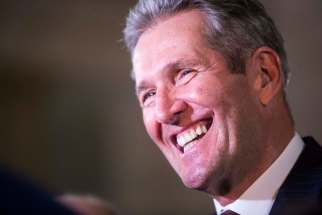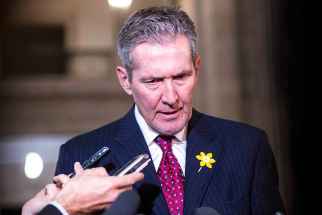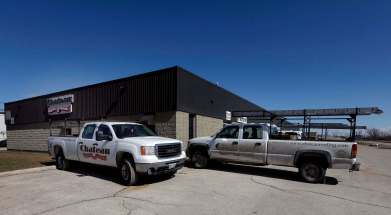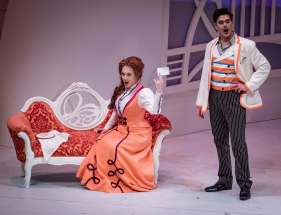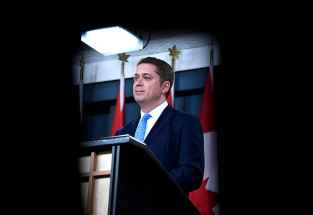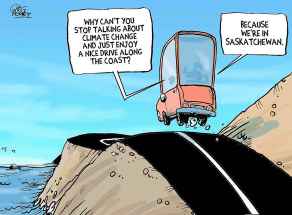Time to consider Indigenous Parliament Independent MLA's private member's bill flawed, but addresses real issue
Read this article for free:
or
Already have an account? Log in here »
To continue reading, please subscribe:
Monthly Digital Subscription
$0 for the first 4 weeks*
- Enjoy unlimited reading on winnipegfreepress.com
- Read the E-Edition, our digital replica newspaper
- Access News Break, our award-winning app
- Play interactive puzzles
*No charge for 4 weeks then price increases to the regular rate of $19.00 plus GST every four weeks. Offer available to new and qualified returning subscribers only. Cancel any time.
Monthly Digital Subscription
$4.75/week*
- Enjoy unlimited reading on winnipegfreepress.com
- Read the E-Edition, our digital replica newspaper
- Access News Break, our award-winning app
- Play interactive puzzles
*Billed as $19 plus GST every four weeks. Cancel any time.
To continue reading, please subscribe:
Add Free Press access to your Brandon Sun subscription for only an additional
$1 for the first 4 weeks*
*Your next subscription payment will increase by $1.00 and you will be charged $16.99 plus GST for four weeks. After four weeks, your payment will increase to $23.99 plus GST every four weeks.
Read unlimited articles for free today:
or
Already have an account? Log in here »
Hey there, time traveller!
This article was published 08/04/2019 (2439 days ago), so information in it may no longer be current.
On Monday, Independent MLA Steven Fletcher introduced the Indigenous Representation and Related Amendments Act in the Manitoba legislature. Fletcher is the controversial former federal cabinet minister and MLA who was ousted from the Progressive Conservatives by Premier Brian Pallister in 2018.
The private member’s bill states that Indigenous peoples have been “let down” by Canada’s electoral system and proposes to “fix” Manitoba’s government by adding four “Indigenous” seats representing four districts in Manitoba’s north, south and the north and south of Winnipeg.
The bill addresses a real issue. Indigenous politicians in political parties often have to compromise their cultural and community principles to vote with their party.
Other countries like Bolivia, Finland, Norway and Sweden have guaranteed Indigenous representation in governments. In the United States, Maine includes two tribal representatives in their state legislature– but they are non-voting members.
If they don’t, they don’t last long.
For more, see Jody Wilson-Raybould.
The problems with Fletcher’s bill begin with asking: who would these Indigenous politicians represent?
First Nations? Métis? Status, on-reserve Indians? Non-status ones? All at once?
Or would they represent Indigenous peoples at all?
At the ballot box, all Manitobans, regardless of ethnicity, would have the choice whether to vote for a party representative in their riding (how it exists now) or in an Indigenous riding — but not both.
To run for office, according to the bill, candidates need to “demonstrate their connection to the Indigenous community to the elections commissioner.”
Do one of those mail-in ancestry tests count?
I have to stop here, because Fletcher’s bill is naïve, undeveloped and absent of almost everything Indigenous.
But it’s interesting nonetheless.
Fletcher based his bill on New Zealand’s electoral system, which since 1867 under the Māori Representation Act allocates seats for Māori representatives in the New Zealand Parliament.
The act came after a series of conflicts between Māori and citizens of New Zealand over lands and resources. Much controversy surrounded the act’s implementation — some thought Māori were savage and inferior — but it has served as a venue in which Indigenous perspectives are heard in their government.
Today, New Zealand has seven out of 120 seats allocated for representatives of Māori. Politicians do not have to be Māori but voters have to be.
None of this has stopped the exploitation of Māori lands and resources of course (majorities serve majorities in democracies), but every time New Zealand politicians propose abolishing the seats, Māori communities steadfastly fight for them.
Other countries like Bolivia, Finland, Norway and Sweden have guaranteed Indigenous representation in governments. In the United States, Maine includes two tribal representatives in their state legislature — but they are non-voting members.
It’s notable that Manitoba’s first government was Indigenous-led and it was Louis Riel and the Métis who invited anglophones to take part, not vice versa. It was this coalition that resulted in Manitoba’s entry into Confederation, separate French schools and protection for Catholicism. In other words— today’s Manitoba.
This is not to forget the thousands of First Nations governments who negotiated treaties and established the political, cultural and geographical makeup of Canada.
Indigenous politicians and governments — when not manipulated, interfered with and undermined — get work done.
Indigenous leaders representing Indigenous communities benefit all citizens.
It’s notable that Manitoba’s first government was Indigenous-led and it was Louis Riel and the Métis who invited anglophones to take part, not vice versa. It was this coalition that resulted in Manitoba’s entry into Confederation, separate French schools and protection for Catholicism. In other words— today’s Manitoba.
This isn’t 1870, however. We have over 150-plus years of Indigenous absence in all aspects of Canada’s governments. Federal, provincial and territorial governments are full of representatives of political parties — most of whom are Canadian first, anything else second (the Parti and Bloc Québecois being the notable exceptions).
The one anomaly in Canada is the government of Nunavut, which has no political parties and features decisions that are called aajiiqatigiinniq, consensus-based. While no seats are specifically Indigenous designated, most politicians are Inuit.
The result is some pretty innovative ideas, like the law of inuuqatigiitsiarniq (respecting others and relationships) and avatittinnik kamatsiarniq (respecting and caring for the land, animals and environment) — found in every law passed. The Nunavut government also has an official council of elders, the Inuit Qaujimajatuqangit Katimajiit, whose job it is to advise and help the government incorporate Inuit culture and traditional knowledge.
In 1996, the Royal Commission on Aboriginal Peoples criticized Canada for its long absence of Indigenous representation in government and recommended a “third Chamber” similar in power to Parliament and the Senate called the House of First Peoples.
Indigenous peoples would devise the makeup of the seats and who they would represent, but this body would debate and propose laws for both Canada and Indigenous nations. Like all government, there would be a need for Indigenous politicians to build allies, negotiate and compromise — just as Parliament does with the Senate.
In fact, this House would be 100 times more useful than the Senate, featuring elected, representative and legitimate representatives.
There is also potential for this body to rectify the ongoing logjam in Canada regarding consultation for land and resource projects. As it stands now, Canada enters into legally mandated “consultations” with Indigenous peoples after initiatives are underway and negotiations with companies have begun. This leads to Indigenous peoples feeling left out, resistant and ignored.
If Indigenous peoples are at every table in government, representing their specific cultural and political interests, they would be there from the beginning — and not the end.
An Indigenous Parliament would not just be a small part of Canada but a full partner. We might even call it a “nation-to-nations” relationship.
Of course, some Indigenous nations would not want to be a part of this body.
I say have them propose ideas for how they would be a partner. They could even propose them to the House of First Peoples.
This is an idea that goes beyond ministries of Indigenous affairs, laws that control and relegate Indigenous nations to municipalities, and a few seats in Canada’s Parliament.
It’s also one Canadians may be interested in. In a 2016 study by Environics, 46 per cent of Canadians “support giving Indigenous peoples more representation in the country’s governing institutions.” A further 29 per cent stated it “depends” and only 16 per cent opposed the idea.
An Indigenous Parliament isn’t a perfect idea, but it’s a radical one.
Because it’s what a fair, just and inclusive Canada actually looks like.
niigaan.sinclair@freepress.mb.ca

Niigaan Sinclair is Anishinaabe and is a columnist at the Winnipeg Free Press.
Our newsroom depends on a growing audience of readers to power our journalism. If you are not a paid reader, please consider becoming a subscriber.
Our newsroom depends on its audience of readers to power our journalism. Thank you for your support.

